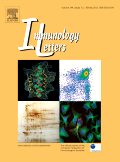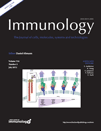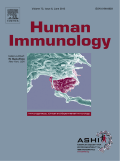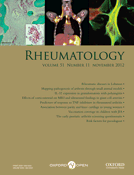
Journal of Translational Autoimmunity
Scope & Guideline
Fostering innovation in the realm of autoimmunity.
Introduction
Aims and Scopes
- Mechanisms of Autoimmunity:
Research that investigates the fundamental biological mechanisms and pathways that lead to autoimmune responses, including genetic, epigenetic, and environmental factors. - Clinical Applications and Therapeutics:
Studies that explore innovative therapeutic strategies, including drug development, immunotherapies, and novel treatment protocols for various autoimmune diseases. - Biomarkers and Diagnostic Tools:
Research aimed at identifying and validating biomarkers for early diagnosis, disease progression monitoring, and predicting therapeutic responses in autoimmune conditions. - Translational Research:
Studies that facilitate the translation of basic scientific discoveries into clinical practice, focusing on how findings in the lab can inform patient care and treatment strategies. - Autoimmunity in Specific Populations:
Investigations into how autoimmune diseases manifest differently across various populations, including age, gender, and genetic backgrounds. - Impact of Infections on Autoimmunity:
Research examining the relationship between infections (like COVID-19) and the exacerbation or initiation of autoimmune diseases.
Trending and Emerging
- Single-Cell Analysis and Omics Technologies:
There is an increasing focus on single-cell transcriptomics and other omics technologies to understand the heterogeneity of immune responses in autoimmune diseases, facilitating personalized medicine. - Novel Therapeutic Targets:
Research is trending towards identifying and targeting novel immune checkpoints and pathways (e.g., LAG-3, IL-17A) for therapeutic interventions, reflecting a shift towards precision medicine in treatment. - Impact of COVID-19 on Autoimmunity:
The COVID-19 pandemic has spurred a surge in studies examining its effects on autoimmune diseases, vaccine responses, and the interplay between viral infections and autoimmunity. - Biomarkers for Disease Monitoring:
A growing emphasis on liquid biopsy and other biomarker studies aimed at predicting disease flares and therapeutic responses in conditions like lupus nephritis and autoimmune hepatitis. - Machine Learning and AI in Autoimmunity:
Emerging utilization of artificial intelligence and machine learning tools for early diagnosis and prediction of autoimmune disease outcomes, showcasing a technological advancement in the field.
Declining or Waning
- Traditional Autoimmune Disease Models:
Research utilizing classical animal models for studying autoimmune diseases has decreased, as newer methodologies and models are being favored for their relevance to human disease. - Descriptive Epidemiology of Autoimmune Diseases:
There is a noted reduction in studies solely focused on the epidemiological aspects of autoimmune diseases without linking to molecular or therapeutic insights, moving towards more integrated approaches. - Static Diagnostic Criteria:
The exploration of static diagnostic criteria without considering the evolving nature of autoimmune diseases has waned, as the field shifts towards more dynamic and personalized diagnostic approaches.
Similar Journals

IMMUNOLOGY LETTERS
Bridging the Gap Between Immunology and Clinical PracticeIMMUOLOGY LETTERS, published by Elsevier, is a distinguished journal in the field of immunology, focusing on the latest advancements and findings that significantly influence immunological research and clinical applications. Established in 1979, the journal has evolved to cater to a global readership, featuring high-quality peer-reviewed articles across a diverse spectrum of topics related to immunity and allergic responses. With an impressive Q2 category ranking in both Immunology and Allergy as of 2023, it holds a strong position within the scientific community, evidenced by its commendable Scopus rankings (Rank #71/233 in Medicine - Immunology and Allergy and Rank #85/236 in Immunology and Microbiology - Immunology). While primarily subscription-based, the journal aims to foster knowledge dissemination that encourages collaboration among researchers and practitioners alike, making significant contributions to the understanding of immune mechanisms. The journal is integral for educators, students, and professionals aiming to stay abreast of current trends and breakthroughs in the immune system's intricate functions.

Immunotherapy Advances
Fostering collaboration and discovery in the world of immunology.Immunotherapy Advances, published by Oxford University Press, stands at the forefront of the rapidly evolving field of immunology and microbe interactions, focusing specifically on novel immunotherapeutic strategies and their clinical applications. Established in 2021, this peer-reviewed journal aims to disseminate high-quality research that contributes to the understanding and advancement of immunotherapeutic techniques, potentially transforming patient care in immunology. With a current Scopus rank of #140 out of 236 in the realm of Immunology, placing it in the 40th percentile, Immunotherapy Advances is positioned to be an integral resource for researchers, healthcare professionals, and students eager to stay updated with groundbreaking findings and methodologies. The journal is dedicated to fostering innovative discussions and collaborations, ensuring open access to vital research that influences treatment paradigms globally.

IMMUNOLOGY
Driving Excellence in Immunological ResearchIMMUNOLOGY is a premier journal published by Wiley that has been at the forefront of the field since its inception in 1958. With an impressive impact factor and classified in the Q1 quartile for both Immunology and Allergy as of 2023, this journal is highly regarded among researchers and professionals alike. It ranks 36th out of 233 in the Medicine/Immunology and Allergy category, and 40th out of 236 in the Immunology and Microbiology segment on Scopus, placing it firmly within the top percentile of its field. The journal is dedicated to publishing high-quality research that advances our understanding of immunological processes, bridging basic science with clinical applications. Although it does not operate under an open-access model, it offers conventional access options that remain integral to the dissemination of vital immunological research. With its broad scope and commitment to scholarly excellence, IMMUNOLOGY continues to serve as an essential resource for those seeking the latest advancements in immunology, fostering innovation and collaboration among scientists globally.

HUMAN IMMUNOLOGY
Illuminating the Pathways of Human ImmunologyHUMAN IMMUNOLOGY, published by Elsevier Science Inc, serves as a critical platform for disseminating research in the fields of immunology and allergy, as well as various aspects of miscellaneous medicine since its inception in 1980. With an ISSN of 0198-8859 and E-ISSN 1879-1166, this journal is pivotal for researchers and practitioners looking to advance their understanding of human immune responses and related conditions. The journal currently holds a respectable position within its field, as highlighted by its 2023 Scopus ranks—#114/233 in Immunology and Allergy and #132/236 in Immunology and Microbiology. Moreover, it maintains a Q2 quartile ranking in both Immunology and Allergy and miscellaneous Medicine, underscoring its influence and reach within the scientific community. Although it does not currently offer Open Access options, HUMAN IMMUNOLOGY remains dedicated to providing valuable insights and fostering academic discourse within its discipline, characterized by a rigorous peer-review process and a focus on innovative research trajectories.

Cellular & Molecular Immunology
Exploring the Depths of Cellular DefenseCellular & Molecular Immunology is a prestigious peer-reviewed journal published by the CHIN SOCIETY IMMUNOLOGY. As a leading journal in the fields of immunology and infectious diseases, it proudly holds a Q1 designation across multiple categories, including Immunology, Allergy, and Medicine (Miscellaneous), reflecting its commitment to excellence and impactful research. With an ISSN of 1672-7681 and an E-ISSN of 2042-0226, the journal has been essential reading since its inception in 2004, continuously gathering insights from cutting-edge studies. It ranks impressively within Scopus, with positions in the 7th, 8th, and 9th percentile in relevant categories, establishing it as a cornerstone for researchers, clinicians, and students alike. The journal offers an extensive range of original research articles, reviews, and clinical studies, ensuring that readers stay at the forefront of immunological discovery. Whether you are interested in basic immunology, infectious diseases, or evolving therapies, Cellular & Molecular Immunology serves as an invaluable resource for advancing your knowledge and engagement in this dynamic field.

IN VIVO
Exploring the frontiers of pharmacology and genetics.IN VIVO is a prestigious academic journal published by the International Institute of Anticancer Research, dedicated to advancing the fields of biochemistry, genetics, molecular biology, cancer research, and pharmacology. With its ISSN 0258-851X and E-ISSN 1791-7549, this journal has been a key contributor to innovative research since its inception in 1987, providing a crucial platform for the dissemination of significant findings in its scope. With an impressive impact reflected in its quartile rankings (Q2 in Biochemistry, Genetics and Molecular Biology and Medicine; Q3 in Cancer Research and Pharmacology), IN VIVO reaches a global audience comprising researchers, health professionals, and students. Although it operates on a subscription basis, the journal’s commitment to scientific excellence and rigorous peer review ensures that all published works maintain high quality and relevance. Notably positioned in Scopus ranks within the 36th to 59th percentiles across various categories, IN VIVO continues to be a vital resource for cutting-edge research and developments, solidifying its importance within the scientific community.

ImmunoTargets and Therapy
Catalyzing Change in Immunotherapy PracticesImmunoTargets and Therapy is a leading open access journal published by DOVE MEDICAL PRESS LTD, dedicated to advancing the field of immunology and its various therapeutic applications. Since its inception in 2012, the journal has rapidly become a vital resource for researchers, professionals, and students, achieving notable recognition with a Q1 ranking in both Immunology and Immunology and Allergy categories as of 2023. With an impressive Scopus ranking of #22 out of 233 in Medicine - Immunology and Allergy, and #25 out of 236 in Immunology and Microbiology, this journal maintains a 90th percentile standing in its field. ImmunoTargets and Therapy not only publishes original research articles, reviews, and clinical studies, but also fosters an inclusive platform for the dissemination of innovative findings critical to the fight against immunological disorders. Based in New Zealand, it serves a global audience, promoting knowledge exchange and collaboration through its open access model.

JOURNAL OF MOLECULAR MEDICINE-JMM
Transforming Research into Revolutionary Medical Solutions.JOURNAL OF MOLECULAR MEDICINE (JMM) is a premier publication dedicated to advancing the field of molecular medicine, encompassing critical areas such as drug discovery, genetics, and biochemistry. Published by Springer Heidelberg in Germany, this influential journal has established its significance within the academic community, achieving an impressive Q1 ranking across multiple categories as of 2023, including Drug Discovery, Clinical Genetics, and Molecular Medicine. With a focus on publishing high-quality research and novel insights, JMM appeals to a diverse audience of researchers, professionals, and students passionate about the molecular underpinnings of health and disease. The journal, which has seen a convergence of relevant research spanning from 1976 to 2024, is instrumental in showcasing groundbreaking studies that push the boundaries of knowledge in molecular therapeutics and biomedical science. While it does not offer open access, the rigor of its peer-reviewed content ensures that each publication is a valuable addition to the scientific discourse surrounding molecular medicine. For comprehensive studies and reviews that highlight the intersection of molecular biology and clinical application, look no further than JOURNAL OF MOLECULAR MEDICINE.

TRENDS IN IMMUNOLOGY
Pioneering Insights for Immunology ProfessionalsTRENDS IN IMMUNOLOGY, published by CELL PRESS, stands as a premier source of insights and developments within the field of immunology. With an ISSN of 1471-4906 and E-ISSN of 1471-4981, this journal has established a strong reputation, evidenced by its prestigious status in Q1 quartiles for both Immunology and Allergy in 2023. It is ranked #13 out of 233 in the Scopus category of Medicine – Immunology and Allergy, and #16 out of 236 in Immunology and Microbiology, placing it within the top 94th and 93rd percentiles respectively. Since its inception in 1987, TRENDS IN IMMUNOLOGY has provided a critical platform for researchers, professionals, and students to access the latest advancements and integrative reviews in immunological research. The journal offers open access options, enhancing the accessibility of its high-impact content to a global audience. Researchers and practitioners rely on its pages not only for cutting-edge findings but also for comprehensive discussions that drive the future of immunology research.

RHEUMATOLOGY
Transforming Treatment with Pioneering Research in RheumatologyRHEUMATOLOGY, published by Oxford University Press, is a leading journal in the fields of Pharmacology and Rheumatology, recognized for its significant contribution to advancing the understanding and treatment of rheumatic diseases. With an impressive impact factor and ranking within the top quartiles for both medical pharmacology and rheumatology, this journal serves as an essential resource for researchers, clinicians, and healthcare professionals. The journal spans an extensive publication history, with contributions from 1952 to 1995 and from 1998 to 2024, reflecting its enduring commitment to disseminating high-quality research. The Open Access option allows for broader dissemination of knowledge, enhancing the visibility of groundbreaking studies. Positioned in the United Kingdom, RHEUMATOLOGY not only offers valuable insights into the latest therapeutic advancements and clinical guidelines but also fosters collaboration across disciplines, ensuring that practitioners stay at the forefront of innovation in the management of rheumatic conditions.